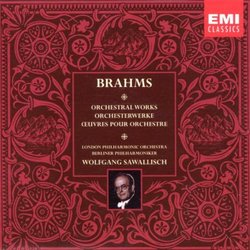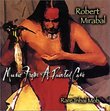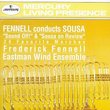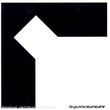| All Artists: Brahms, Sawallisch Title: Sym 1-4 / Piano Ctos 1-2 / Violin Cto / Double Cto Members Wishing: 0 Total Copies: 0 Label: EMI Classics Release Date: 11/5/2002 Album Type: Box set Genre: Classical Style: Symphonies Number of Discs: 7 SwapaCD Credits: 7 UPCs: 724357550222, 072435755022 |
Search - Brahms, Sawallisch :: Sym 1-4 / Piano Ctos 1-2 / Violin Cto / Double Cto
 | Brahms, Sawallisch Sym 1-4 / Piano Ctos 1-2 / Violin Cto / Double Cto Genre: Classical
|
Larger Image |
CD DetailsSimilarly Requested CDs
|
CD ReviewsA Wonderful Bargain T. Beers | Arlington, Virginia United States | 03/31/2003 (5 out of 5 stars) "In this elegant and efficiently packaged compact box from EMI you get all of Brahms's orchestral music (except the two serenades) in first-rate performances at an unbeatable price. Wolfgang Sawallisch is one of the most distinguished conductors alive today and his performances of the great German classics are always worth listening to. Not a showman or an attention-grabber, Sawallisch unfailingly delivers beautifully thought-through performances that are nuanced and subtle. As a result, his work can strike some people as too laid back and emotionally reticent. Musicians, on the other hand, marvel at what they hear. (Check out the DVD version of the documentary film "The Art of Conducting," where long-time Sawallisch fan and colleague Elisabeth Schwarzkopf doesn't hesitate to mention him in the same breath with Klemperer, Boehm, Furtwaengler and Toscanini.) Especially if you're past the neophyte stage as a Brahms listener, you're likely to find Sawallisch's performances very satisfying. As far as specific performances go, let me admit that in another Amazon.com review I've compared these Brahms symphony recordings unfavorably with an earlier Sawallisch set on Philips. I've now changed my mind because EMI apparently has remastered the performances for this box set and they now sound marvelously fresh and alive - even better played(!) than on previous issues. Ditto the two overtures, Haydn Variations and "Schicksalslied." The concerto performances, gorgeously imagined and performed with scrupulous attention to structural detail, are also excellent. Sawallisch seems to have found his ideal partner in pianist Stephen Kovacevich, who matches the conductor insight for insight in the two piano concertos ... just listen to how magically Kovacevich and Sawallisch conjure Mozart in the finale of the B-flat concerto! The two string concertos are also done memorably by Frank Peter Zimmerman, with cellist Heinrich Schiff assisting in the great, late Double Concerto. Finally, the set provides a generous number of bonus performances including handsome renditions of the Mozart third violin concerto (with Zimmerman); some Brahms lieder (performed by Kovacevich and Ann Murray); and the wonderfully autumnal Horn Trio (where Sawallisch himself presides at the piano). Even if you own other performances of this music, I urge you to buy this set: it provides a remarkably satisfying brahmsian synthesis of public rhetoric and private emotion that I'm sure will continue to impress you the more you listen. Sound quality is marvelously warm and true for a digital recording." A Brahms collection well worth remembering Mr. Ian George Fraser | Brazil | 02/14/2007 (5 out of 5 stars) "Everyone is looking for a bargain these days and too often we get cheated with something cheap and nasty. Don't get nervous, however. This is a real nugget.
The title may be slightly misleading. It's not just Brahms' orchestral works - there are also chamber pieces and Lieder with just a little Mozart Violin Concerto thrown in to fill up the space...though I'd have preferred a Brahms clarinet quintet. Ach weh, das Leben ist nie perfekt! If you think of the great 20th century conductors, Wolfgang Sawallisch is probably not the first name that springs to mind. Yet you would be hard put to it to find anything to fault with any of these performances and some are truly outstanding. The Violin concerto is probably not one of these, because of the final movement, yet Franz Peter Zimmerman as soloist has perfect intonation and the Berlin Philharmonic for the most part plays with him in beautiful balance. It's a fine partnership with some lovely and some very dramatic moments. I just wish the finale had been played with a little more rubato. There's nothing wrong with it, but it's definitely more German than Hungarian. The Berlin Philharmonic also plays in the Mozart. The rest is all with the London. Let's come to the First Piano Concerto. For me this is a seminal Brahms work. Put together out of the ruins of the "first" symphony this is a youthful but extraordinarily complex piece full of extreme contrasts, with violent and passionate emotions vying with moments of pure lyricism. For the soloist it is less technically than physically and emotionally demanding with its many pages of `doubled' writing but Stephen Kovacevich (Bishop) is the ideal pianist for it, never flagging, even in the monumental finale. This is a performance of immense power, strength, beauty and warmth, encapsulating as it does, and as no other does, both the despair and triumph of youthful passion, and I can honestly say I have never heard it better performed. In it Sawallisch shows himself to be the perfect conductor, holding the orchestra back and giving the soloist free rein and then applying full throttle at exactly the right moments. Twenty-two years separate the two piano concertos, yet what is most striking is the similarity between the two works, the Second being, if anything even more symphonic than the First with its four movements. The conflict here is not between the piano and the orchestra - each is locked together in the first two movements in a joint and at times arduous battle with the Fates - yet in many ways it's also more like a gigantic piano quintet and Sawallisch and Kovacevich work here in perfect harmony to establish a fantastic rapport. In the third movement the structure is perhaps even songlike with the pianist accompanying the orchestra, particularly the cello, rather than vice versa and the finale is pure delight with both orchestra and piano ending up hopping and skipping round each other in a charming puckish way. Brahms is here at his most winsome and appealing and this is one of the lightest and most attractive endings I have heard to an otherwise at times very intense and demanding piece of music . Many will buy this selection for the orchestral works - well that is after all what it says on the label - so I imagine there will also be many who are surprised to find the Lieder. Brahms was a wonderful composer of songs and his unerringly full-blooded choice of lyric - to which he always paid the closest attention - puts him right at the forefront of the great romantic song composers of the period, though it is here that his debt to Schumann is probably at its greatest. Ann Murray has a lovely voice and though I would not put her front of Schwarzkopf or Kathleen Ferrier, these are more than respectable performances. Stephen Kovacevich shows a different but very impressive side of his talent as accompanist. My favorite here, however, is his setting for choir and orchestra of Hölderlin's deeply pessimistic Hyperions Schicksalslied, which absolutely transforms the poem and gives us a wonderful glimpse at least of Ein Deutsches Requiem. It would be beyond the scope of this commentary to review the performances of the four Symphonies in detail, not to mention the ability of the reviewer! Suffice it to say that Sawallisch and the London Philharmonic play these all with strict attention to Brahms' markings and excellent dynamic contrast, though always remaining aware that during the 20th century, like it or not, tempi in most classical pieces did speed up. No-one can play Brahms successfully without, at the right moments, passion, and for me the highlight (one of many) was the swirling attack in the emotionally turbulent opening to the First Symphony. Sawallisch cannot fail to have been aware of the immense presence of Karajan in these symphonies and to his eternal credit he does not attempt to fight with this, by striving to be different, but lets the orchestra "have its head" and as a consequence his performance of the battling First Symphony is very fine indeed. The key moment in this work for me is the entry of the horn in the slow introduction to the finale and I'm pleased to say, in this performance it is absolutely right. The second symphony, composed only a year later in the beautiful surroundings of the Wörther See in Austria's Lake District, is altogether a much more relaxed affair, and a great opportunity for the conductor to allow the orchestra a chance really to show its style, which is precisely what Sawallisch does and this is one of the London Philharmonic's most sumptuous performances. Interestingly for the Third Symphony Sawallisch opts for the slower Klemperer tempi and there is some very grand playing here, especially in the richly contrasted first movement. However, I feel in the third movement he is a tad too slow, with the result that some of the seething and restless undercurrents are allowed to fade. This is a very "classical" rendering of a tragic work in which the finale is seen, and I'm sure Brahms was striving for this, as both resigned and conclusive. I don't really feel, however, that Sawallisch has quite got to the bottom of this profoundly ambiguous piece. As for the Fourth, in this symphony often described as "autumnal" or "resigned" but probably one of the most passionate and perturbed of all Brahms' works, with time and again the resolution of soft legato passages broken into by turbulent outbursts, Sawallisch does not quite get the same precision of playing in the third movement as Karajan and at one point seems to lose the rhythmic impetus altogether, however, he quickly regathers it and the final passacaglia is as bold, dramatic, and tragic, as anyone could wish for. The best is saved till last. Who else but Brahms could have composed a world class piece for an instrument that can only play about 11 notes, the Waldhorn? Well he does, and this work, the Horn Trio Op.40, is pure joy from beginning to end, the only hint of sadness being in the slow movement, which is an elegy on the death of his father, who was, guess what, a Waldhorn player. The violinist in this piece is Franz Peter Zimmerman, the same as who performed so well in the Violin Concerto and the pianist none other than Wolfgang Sawallisch, one of the very few recordings of him as a performer. Warum, ich frage mich? The final movement simply bounds along, with some perfect staccato playing by Marie Luise Neunecker on such an abominable instrument! No-one could ever have had a better ride into Elysium. Is this a bargain? Well I'll let you judge for yourself, but this is my only Brahms recording and I won't be buying another, I imagine, for a little while yet. I suppose purely on the strength of the performances it's 4 stars rather than 5, but given the price and the range of the set, it would be churlish not to give it its 5. " |

 Track Listings (8) - Disc #1
Track Listings (8) - Disc #1




